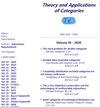State of Urban Transport in a Nigerian Traditional City
IF 0.4
4区 数学
Q4 MATHEMATICS
引用次数: 0
Abstract
This study appraised the state of urban transport in a Nigerian traditional city. It examined commuters’ socio-economic and transit characterization, assessed the quality of transport infrastructural facilities and services, and identified the challenges of urban transport services in Ibadan city, Nigeria. 163 copies of questionnaires were systematic randomly administered on commuters along six (6) selected traffic-corridors in Ibadan. Both descriptive and inferential (Binary Logistics Regression) statistics were used for data analysis. Major findings revealed majority (about 40%) of commuters were civil servants and earn above 90,000 naira as monthly income. Mean Weighted Value results show that taxi (3.913) and motorcycle (3.756) are dominant and most patronized means. Similarly, the availability (4.075), safety (4.000) and affordability (3.625) were most-weighted factors influencing commuting modal choice, while a trip to work (3.718) and market (3.200) are most generated trips in Ibadan. Meanwhile, most of the assessed infrastructural facilities were of poor quality, while peak/off-peak transit issues (4.050) and vehicular mechanical failure (3.487) were major challenges affecting urban commuting. Binary logistics regression results show that the condition of urban transport infrastructural facilities significantly influence overall satisfaction with urban commuting (p < 0.000). Cox & Snell's R-Square (36%) and Nagelkerke’s R (70%) show that the model is relevant in predicting the relationship between dependent and independent variables. The study concluded that there is a need to improve urban transport system towards ensuring commuters satisfaction and urban development. Hence, recommended among others, integrated transport system with smart devices and improved conventional public transport scheme in Ibadan.尼日利亚传统城市的城市交通状况
本研究评估了尼日利亚一个传统城市的城市交通状况。它检查了通勤者的社会经济和过境特征,评估了交通基础设施和服务的质量,并确定了尼日利亚伊巴丹市城市交通服务的挑战。在伊巴丹的6条选定的交通走廊上,系统地随机发放了163份调查问卷。使用描述性和推理性(二元logistic回归)统计进行数据分析。主要调查结果显示,大多数(约40%)通勤者是公务员,月收入在9万奈拉以上。平均加权值结果显示,出租车(3.913)和摩托车(3.756)是最主要的出行方式。同样,可获得性(4.075)、安全性(4.000)和可负担性(3.625)是影响伊巴丹通勤方式选择的最重要因素,而上班(3.718)和市场(3.200)是产生最多的出行方式。同时,大部分被评估的基础设施质量较差,高峰/非高峰交通问题(4.050)和车辆机械故障(3.487)是影响城市通勤的主要挑战。二元logistic回归结果显示,城市交通基础设施状况显著影响城市通勤总体满意度(p < 0.000)。Cox & Snell的R平方(36%)和Nagelkerke的R(70%)表明,该模型在预测因变量和自变量之间的关系方面是相关的。该研究的结论是,有必要改善城市交通系统,以确保通勤者的满意度和城市发展。因此,除其他外,建议在伊巴丹采用智能设备的综合运输系统和改进的传统公共交通计划。
本文章由计算机程序翻译,如有差异,请以英文原文为准。
求助全文
约1分钟内获得全文
求助全文
来源期刊

Theory and Applications of Categories
MATHEMATICS, APPLIED-MATHEMATICS
CiteScore
1.30
自引率
0.00%
发文量
0
期刊介绍:
The journal Theory and Applications of Categories will disseminate articles that significantly advance the study of categorical algebra or methods, or that make significant new contributions to mathematical science using categorical methods. The scope of the journal includes: all areas of pure category theory, including higher dimensional categories; applications of category theory to algebra, geometry and topology and other areas of mathematics; applications of category theory to computer science, physics and other mathematical sciences; contributions to scientific knowledge that make use of categorical methods.
 求助内容:
求助内容: 应助结果提醒方式:
应助结果提醒方式:


